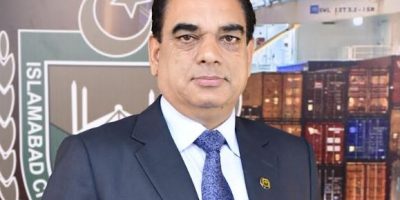Pakistan budget 2025–26: Propagandists claim of 80pc allocation to defense sector as unrealistic

PESHAWAR, Jun 12 (APP/DNA):There is a common perception in Pakistan that most of the national budget was spent on defense sector that was termed ‘unrealistic’ and incorrect by the security experts.
“This claim is frequently echoed on social media and in public discourse, suggesting that 70 to 80 percent of Pakistan’s total national budget is allocated to the military which is totally false and unrealistic” said Brigadier (Retd) Mahmood Shah while talking to APP.
He said these claims were not only baseless but also seems to be part of a deliberate attempt to promote a negative narrative aimed at misleading the public and sowing distrust toward national institutions.
“The India’s aggressive designs under the fascist Modi government, and evolving trends in modern warfare including cyberattacks, drone technology, artificial intelligence, and information warfare have made it imperative for Pakistan to upgrade its defense preparedness” he said.
In light of these realities, he said the federal government has proposed a 20 percent increase in the defense budget for the fiscal year 2025–26 which is positive and realistic approach.
The amount allocated for defense affairs and services in the federal budget has been raised to Rs. 2,557.95 billion, which is 20.2 percent higher than the original estimate of Rs. 2,128.78 billion for FY 2024–25, and 16.8 percent higher than the revised estimate of Rs. 2,189.91 billion.
According to budgetary allocations, Pakistan Army has been earmarked Rs. 1,058 billion, Pakistan Air Force is set to receive Rs. 520.74 billion compared to Rs. 451 billion in the previous fiscal year while Pakistan Navy will receive Rs. 265.97 billion, up from Rs. 230 billion.
“Despite this clear facts, certain negative groups including propagandists, anti-state elements, individuals engaged in misleading journalism, and proponents of foreign agendas attempt to portray the increased defense budget negatively.
These entities repeatedly claim, falsely, that 70 percent to 80 percent of the budget is spent solely on the military. The objective behind such negative statements is to create the impression that national resources are consumed exclusively by the defense sector, leading to the neglect of development projects and public welfare.
In reality, Pakistan’s annual budget is divided among various sectors, including education, health, development programs, subsidies, debt servicing, and administrative functions. The defense budget, while significant, constitutes only a limited portion allocated to ensure national security.
He said considering current regional and global security dynamics, increasing the defense budget was a logical and necessary step for any responsible state.
Historically, he said Pakistan’s defense budget has hovered between 2 percent to 2.5 percent of the GDP, covering all three branches of the Pakistan Armed Forces — the Army, Air Force, and Navy.
He said out of this landmark budget, 48 percent is allocated to the Army, 20 percent to the Air Force and 10 percent to the Navy,
The senior defense analyst said the remaining portion goes to inter-services organizations, the Defense Production Division, and the Pakistan Military Accounts Department.
Brigadier Mahmood Shah said that a large portion of the defense budget was spent on personnel salaries and related benefits, adding other key areas of expenditure include healthcare, training, operations, maintenance, procurement of equipment, and infrastructure.
Historical defense budget figures (in USD) include, 1990: $2.65 billion,1993: $3.10 billion, 1996: $3.37 billion, 1999: $4.24 billion, 2002: $4.86 billion, 2005: $5.86 billion, 2008: $6.80 billion and 2011: $7.67 billion respectively.
The selected annual budget allocations includes in 2014–15: Total budget Rs. 3,945 billion; defense Rs. 700 billion (17.75 percent), 2015–16: Rs. 4,300 billion; defense Rs. 780 billion (18.13 percent), 2016–17: Rs. 4,400 billion; defense Rs. 860 billion (19.55 percent), 2017–18: Rs. 5,003 billion; defense Rs. 920 billion (17.35 percent), 2018–19: Rs. 5,932 billion; defense Rs. 1,100 billion (18.54 percent), 2019–20: Rs. 7,022 billion; defense Rs. 1,150 billion (16.37 percent), 2020–21: Rs. 7,136 billion; defense Rs. 1,290 billion (18 percent), 2021–22: Rs. 8,487 billion; defense Rs. 1,373 billion (16.17 percent).
The salaries takes Rs. 481.59 billion, operating costs stands at Rs 327.13 billion, assets remains Rs. 391.49 billion while civil works stood Rs. 169.77 billion.
For 2022–23, Rs. 1,523 billion was allocated for defense while salaries take Rs. 567 billion, operations costs remained Rs. 368 billion, procurement & ammunition imports are Rs. 411 billion besides Rs.175 billion for civil works.
In 2023–24, the defense budget stood at Rs. 1,523 billion, about 2 to 2.5 percent of GDP.
For 2024–25, defense was stood at 11.23% of the total budget — Rs. 2,122 billion out of a total Rs. 18.877 trillion, meaning 87.77 percent went to non-military sectors.
For 2025–26, the federal government has proposed a total budget of Rs. 17,573 billion, with Rs. 2,550 billion allocated for defense. “The simple arithmetic shows that this amounts to only 14.51 percent of the total budget.”
While referring to the percentage calculation, he said one percent of the total budget is equal to Rs. 175.73 billion while
Rs. 2,550 billion ÷ Rs. 175.73 billion = 14.51 percent
Dr Mehmood said this proves that only 14.51 percent of the total national budget is allocated to defense and not 70 percent or 80%, as falsely claimed by propagandists.
He said it was also important to understand that the Rs. 2,550 billion defense budget was not designated for just one branch, but for the combined expenses of the Army, Navy, and Air Force. This amount covers salaries, operational costs, training, procurement of defense equipment, and expenses related to ongoing counterterrorism efforts.
He said Pakistan is a nuclear power facing multiple internal and external security challenges. The region’s geopolitical situation, relations with neighboring countries, border tensions, and the threat of terrorism necessitate a strong and active defense system.
He said under such circumstances, maintaining a reasonable and balanced defense budget was crucial for ensuring the country’s sovereignty and security.
Undoubtedly, in any democratic society, he said it is the right of citizens to question government policies, budgets, and institutions for the sake of improvement.
However, such criticism should be rooted in truth and aimed at constructive reforms — not driven by falsehoods, deception, or propaganda.
Brigadier Mahmood said true patriotism demands that even when we disagree, we do so with honesty, responsibility, and a commitment to facts.
He said now it was the time to base national discussions on facts rather than rumors and propaganda.
As patriotic citizens, instead of unfairly targeting the armed forces, we should recognize that even with limited resources, Pakistan’s military continues to defend the country against both internal and external threats with remarkable efficiency.
Related News

Trade focused diplomacy essential to support exporters: ICCI President
ISLAMABAD, FEB 7 /DNA/ – President Islamabad Chamber of Commerce and Industry (ICCI), Sardar TahirRead More

RCCI hails $3.4bn Pak-Uzbek business deals as milestone
ISLAMABAD, FEB 6 /DNA/ – Strengthening bilateral economic ties, Pakistan and Uzbekistan have taken aRead More


Comments are Closed